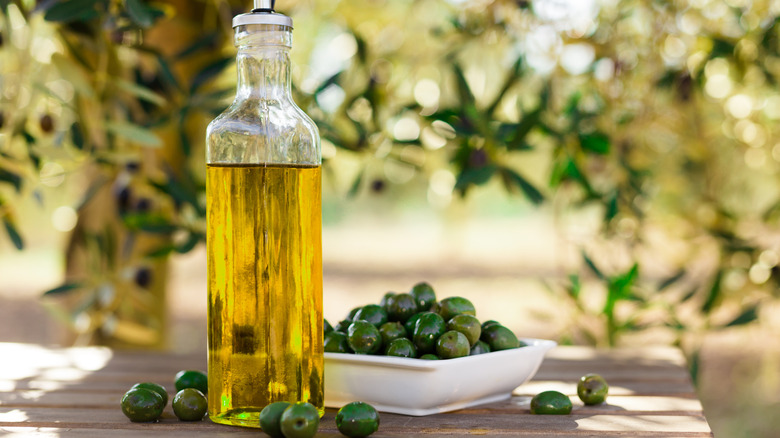The One Spot In The Kitchen You Should Never Store Olive Oil
Olive oil is a perfect addition to salads, soups, marinades, and even yogurt or coffee. For example, Starbucks has launched Oleato, a line of olive-oil-infused coffee. The unexpected combination "yielded a velvety smooth, rich texture, with the buttery, round flavors imparted by the olive oil perfectly pairing with the soft, chocolatey notes of the coffee," Amy Dilger, a beverage developer at Starbucks, said in a February press release.
What sets olive oil apart is its high nutritional value. Rich in monounsaturated fats, this pantry staple can boost heart health and reduce cancer risk. Perhaps not surprisingly, people who consume at least half a tablespoon of olive oil daily have a 14% lower risk of heart disease than non-consumers, reports a 2020 study featured in the Journal of the American College of Cardiology. Moreover, the antioxidants and fats in olive oil may protect against stroke, inflammation, diabetes, and high blood pressure.
The problem is that some people are using olive oil all wrong, which may cancel out its benefits. For starters, think about where you normally store this food ingredient. Keeping it in the sun or near a heat source can lead to oxidation, affecting its flavor, texture, and nutritional profile.
Why you should store olive oil away from the stove
Olive oil can last about 24 months, but some varieties have a shorter shelf life. For example, extra virgin olive oil undergoes minimal processing and lasts only 12 to 18 months, according to a 2018 review published in Helyon. Its shelf-life depends largely on the storage conditions. Your best bet is to keep the oil away from oxygen, heat, and light, as these elements can affect its antioxidant levels and cause deterioration. Therefore, you should never place it near the stove or other heat sources.
Improper storage conditions can reduce the phenolic content of olive oil by up to 60%. Polyphenols are naturally occurring compounds that protect your cells against oxidative stress, notes Colorado State University. When consumed as part of a balanced diet, they may lower your risk of heart disease, cancer, and other chronic ailments. So, if you store the oil next to a heat source, you'll be missing out on these nutrients.
Light and heat can also affect the levels of volatile compounds in olive oil, as well as its flavor, color, and aroma. With that in mind, it should be easy to tell if your olive oil has gone bad. Chances are, it will have a sour or bitter taste and an odd smell similar to that of glue, old paint, or Play-Doh. The oil can also become tasteless or overly greasy.
How to keep olive oil fresh for longer
Generally, it's best to store your olive oil in a cool, dark place away from the stove or microwave oven. Don't place it next to the window or in direct sunlight, either. Any of these factors can speed up the oxidation process, causing the oil to turn rancid.
For lasting freshness, keep the oil in a metal container or dark glass bottle at a temperature below 71.6 degrees Fahrenheit. Transparent glass or plastic bottles allow the light to pass through them, resulting in photo-oxidation. Make sure you close the bottle tightly to prevent the air from getting inside.
Another option is to refrigerate olive oil, especially if you plan to use it over a longer period of time. This storage method shouldn't affect its flavor or nutritional value, but the oil will eventually solidify. Also, note that it's safe to freeze olive oil. You can even mix it with rosemary, garlic, thyme, or other herbs and spices, pour it into ice cube trays, and freeze it for later use. Homemade herb-infused oil can be a healthy addition to pasta, salads, bruschetta, pizza, and other dishes.


